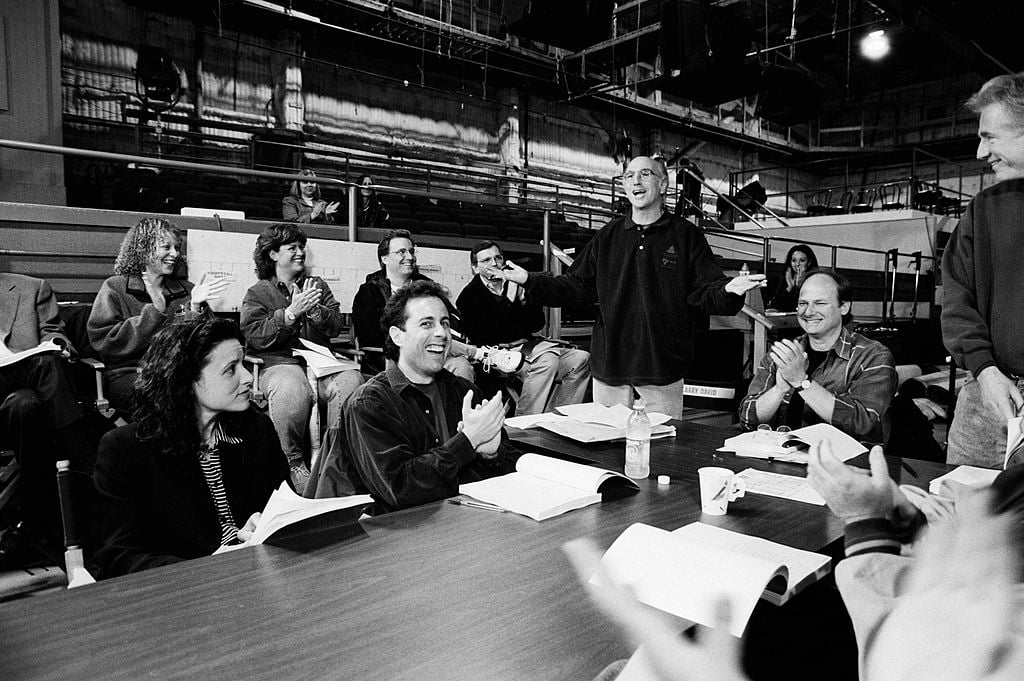‘Seinfeld’: Larry David Created Dark Humor By Enforcing 2 Rules for Writers — ‘No Hugging, No Learning’
Skeptics never expected Seinfeld to become one of the most beloved cult classic comedies in the history of television. The humor was strange, the characters weren’t likable, and perhaps most perplexing of all, the entire show seemed to be about nothing. Creator Larry David had to threaten to quit multiple times to fully bring his brand of comedy to life.
Even though Seinfeld broke every mold, they did stick to a few very important rules for the show. David had a vision when it came to Seinfeld and he was unwilling to compromise on his key principles for the series. That’s why you’ll never see Jerry, Elaine, or George experience emotional growth or learn life lessons — that was never the point.

Larry David enforced ‘no hugging, no learning’ rules for Seinfeld
There weren’t too many taboo topics on Seinfeld, which was very much a show ahead of its time. The gang tackled sensitive issues including masturbation, homosexuality, psychological abuse, and faking disabilities, to name a few. But one thing writer and creator David wouldn’t tolerate was thinly veiled public service announcements.
As Matt Zoller Seitz at Vulture wisely observed, “Seinfeld was never content merely to amuse. It seemed to loathe the idea that audiences might get too comfortable with it. David admonished the writing staff that there would be ‘no hugging, no learning’ in the scripts, and there wasn’t. Ever.”
‘Seinfeld’ writers went out of their way to be offensive
While some fans insisted Seinfeld was merely a realistic portrayal of life in New York City, critics were blown away by how dark it actually was. Rather than embracing a sort of benign existence, the writers seemed intent on exposing the worst aspects of human nature with their cast of unapologetically nihilistic characters.
“Seinfeld went out of its way to provoke, baffle, and offend,” Seitz continued. “It was often blasted as showoff-y, cold, even hateful. (When George’s fiancée died from licking toxic envelopes, he seemed to get over it in seconds.) Seinfeld was, to quote a phrase from the Grinch’s theme song, as cuddly as a cactus and as charming as an eel.”
The show pioneered the way for the future of television
Seinfeld changed the landscape of television in a major way by allowing their character to be their authentic selves without caring what people — including viewing audiences — thought about it. David’s “no learning” rule meant that future shows would include antiheroes like Tony Soprano, Breaking Bad’s Walter White, and Six Feet Under’s Nate Fisher, who were ruthless and unapologetic just like Seinfeld‘s leads.
And it wasn’t just the cast who became less likable — Seinfeld also pioneered the concept of a less-than-satisfying series finale. The last episode ever featured the four friends feeling zero remorse for not helping a man who got carjacked. Instead of learning a single thing over the years and years of situations just like this, Jerry, Elaine, George, and Kramer cheerfully keep on being their terrible, selfish selves in a prison holding cell right up until the final credits roll.
It may have been revolutionary at the time. But now Seinfeld’s brand of comedy is ubiquitous, all because they were brave enough to try it out first.


